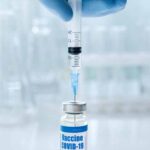 The development of a vaccine for COVID-19 changed the course of the pandemic; however, it also raised questions about whether to withhold or reduce immunosuppressive therapies and other medications for patients with inflammatory, rheumatic and musculoskeletal disease (IRMD), note the authors of a new study published in Annals of the Rheumatic Diseases.
The development of a vaccine for COVID-19 changed the course of the pandemic; however, it also raised questions about whether to withhold or reduce immunosuppressive therapies and other medications for patients with inflammatory, rheumatic and musculoskeletal disease (IRMD), note the authors of a new study published in Annals of the Rheumatic Diseases.
An argument for reducing or discontinuing methotrexate and other immune-suppressing anti-rheumatic drugs at the time of a SARS-CoV-2 vaccination is that it may improve the ability to trigger the humoral antibody response to the vaccine. On the other hand, the clinical significance of such an improved response is yet to be determined, and withholding medications carries the potential risk of exacerbating the disease, noted the study’s author, Pedro Machado, PhD, a professor of rheumatology and neuromuscular diseases at University College London Queen Square Institute of Neurology, in an email interview.
Machado et al. investigated the frequency and factors associated with IRMD flares in patients who were vaccinated against SARS-CoV-2.1
Results from the large, international study showed flares were uncommon following SARS-CoV-2 vaccination among patients with IRMD, a finding that may advance treatment approaches for patients before and after vaccination against COVID-19, say the study’s authors.
Some patients may be concerned the COVID-19 vaccine may trigger flares, or those who are immunosuppressed may worry the vaccine will give them the infection it is meant to prevent. The study’s authors say this research will help patients and their rheumatologists decide together the best approach to management of IRMD with respect to vaccination.
“Our findings confirm that while flares in IRMDs following SARS-CoV-2 vaccination are possible, they are infrequently observed,” says Dr. Machado.
“It’s reassuring data about COVID vaccinations in systemic autoimmune rheumatic diseases,” says Bharat Kumar, MD, MME, FACP, FAAAAI, RhMSUS, physician editor of The Rheumatologist.
Existing Guidance
Recommendations from EULAR and the ACR differ somewhat on how or whether to use anti-rheumatic drugs at or near the time a patient with IRMD receives a COVID-19 vaccine. The ACR recommends withholding methotrexate and certain other drugs in patients with controlled disease; however, EULAR does not recommend reducing or halting anti-rheumatic drugs, with the exception of rituximab.
The ACR guidelines and guidance are intended to be adaptable, living documents that get updated as evidence evolves, notes Jeffrey Curtis, MD, MS, MPH, Marguerite Jones Harbert-Gene Ball Endowed professor of medicine in the Division of Clinical Immunology and Rheumatology at the University of Alabama at Birmingham.2 Therefore, the guidance on whether to hold or delay immunosuppressive medications in relation to timing a COVID-19 vaccine can change in the face of new evidence, and more recent guidance by the Centers for Disease Control & Prevention may supersede earlier guidance, Dr. Curtis said in an email interview.





